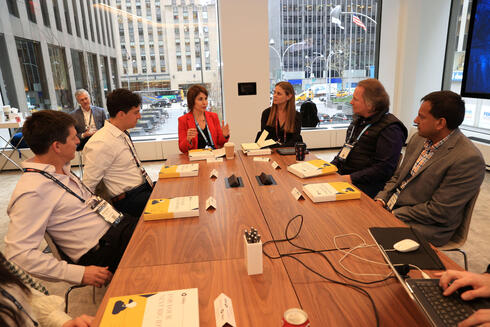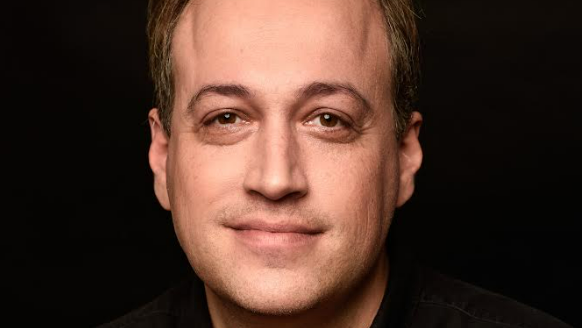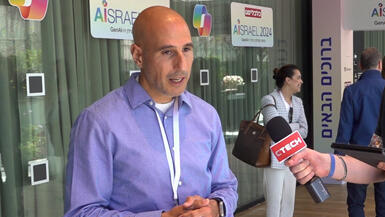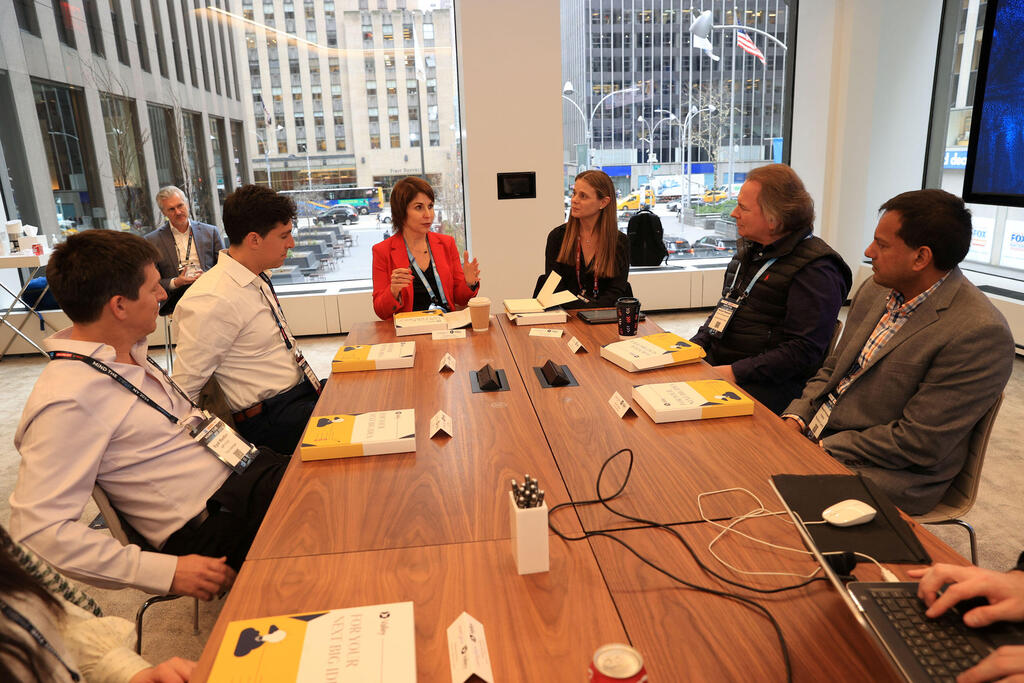
Mind the Tech NY 2024"Entrepreneurs understand that they cannot wait any longer and that they need to start raising funds"
Mind the Tech NY 2024
"Entrepreneurs understand that they cannot wait any longer and that they need to start raising funds"
Eyal Redler, co-founder and managing partner of Bank Leumi's The Garage, was speaking during a round table event held at Calcalist and Bank Leumi’s Mind the Tech Conference in New York. Richard Seewald, founder and managing partner at Evolution Equity Partners: "We are overall optimistic about the coming year"
"This year we decided to talk about the unique situation created in the market - economic and geopolitical challenges, alongside special opportunities in the technological world," said Ori Kaufman Gafter, head of international and tech banking at Valley National Bank, at the opening of the Valley National Bank and Bank Leumi round table event, which was held as part of Calcalist and Bank Leumi’s Mind the Tech conference in New York. The discussion was moderated by Kaufman-Gafter together with Maya Eisen Zafrir, CEO of LeumiTech.
Kaufman-Gafter opened the discussion by noting the decrease in high-tech investment volumes in the world and in Israel. "There is a lot of money available for investment. So the question is how do you see the main trends in the coming year, and are there reasons to be optimistic?"
Richard Seewald, founder and managing partner at Evolution Equity Partners said, "We are overall optimistic about the coming year. It seems that the valuations are becoming more reasonable. We are looking for companies that have good entrepreneurs and technology that can be used for entire categories. In Israel we found several good companies. We made an exit from an Israeli company - Talon, which was sold to Palo Alto Networks. So we see big potential in investing in Israeli cyber companies."
Ramesh Venugopal, partner at Riverwood Capital, said that "Every stakeholder in the market has a different way of looking at it. There are the limited investors, LP, there are the funds, there are the strategic buyers and the companies. The strategic buyers are becoming more and more significant in all sectors. This is a good sign. Today, raising money is a challenging thing. Raising funds is challenging. But it is not only a question of free money but also of distribution. You can see a situation where a lot of money flows to the big funds. There is high concentration. And this also makes it difficult to raise funds. I think there are opportunities among companies, especially those that have reached a significant volume of activity but are not yet public."
Melseda Hoxha, director of TriplePoint Capital, a fund that specializes in providing debt financing to technology companies, said that "we encounter special situations that allow us to build real partnerships. There are entrepreneurs who are in a situation where they ask themselves how they can continue to grow while being required by the investors to make cuts. Debt that is tailored to these companies has the answer to that. Smart debt instruments can help companies advance to the next level."
Eyal Redler, co-founder and managing partner of Bank Leumi's The Garage, which is a fund that invests in early-stage technology companies, said, "I agree with the fact that things need to be looked at according to the perspective. When you invest at an early stage, like us, we are less dependent on the global macroeconomic trends. If there is a good team and a good product, we will invest in these companies. We are not preoccupied in the early stage with the question regarding the exit route. Many entrepreneurs feel that due to all the difficulties of the last six months, they understand that they cannot wait any longer, and that they need to start raising funds. It is impossible to wait for the ideal timing. So they go out and raise money."
Dave Eisenberg, founding partner of Zigg Capital, said that "it's hard to be a venture capital investor without being optimistic. I invest in real estate as well as technology. In my world, the increased interest rate is a very painful thing. The increased interest rate raised all costs. At the same time, the income also decreased. In our world, many have moved away from speculative investments. Now everyone wants to know how much every dollar they invest will return. Startups cannot necessarily provide an answer to this question. In 2024 we are entering some sort of survival mode. Companies will have a harder time, maybe even more than during the pandemic. The companies that will succeed in fundraising are the ones that have something really interesting to offer. You can be optimistic. Many investors will have many opportunities in the public market, even more so than the private market. Investing when others are afraid - that's how you make money. What is exciting at the moment for investors is that they have more time to decide what they want to invest in."
Eisen Zafir asked, “How can you know that it is indeed the time to invest, and that it is not a situation where you make investments and then find out that the situation has only gotten worse."
Eisenberg replied that "we have to go back to the basics to answer that. If I can get high yields in bonds, that creates a challenge for venture capital. The field has to prove itself in the end. After all, we are asking investors to lock up their money for many years in exchange for a many-fold return. So it may be that in the end we will see fewer players in the field, because there will be those who will disappoint. Venture capital will continue to exist as an independent investment field as long as it proves over time that it really provides significantly higher returns than traditional private equity funds."
Venugopal added that "no one has a crystal ball. It's refreshing to see that these days managers are coming up with possible scenarios, and with plans to achieve flow balance. This is something we haven't seen before. It's a change in mindset. It's an important thing. It's a very positive thing. I also see honest and meaningful introspection. The companies approach things in a more mature way, and they also know which avenues to turn to - from the types of investors to the answer to the question of whether they are ready for an IPO."
Kaufman-Gafter said that "a similar trend is also seen in the field of technology banking. After the collapse of SVB, you can really see that companies and entrepreneurs have undergone a change."
Redler said that "Venture capital funds will have to make more of an effort. Throughout history, we have seen that most funds have actually failed. The funds will have to create relationships that will create real added value for companies."
Eisenberg said that "AI and technological advances are a wake-up call for tech companies. These companies need to better examine the durability of their models, both at the product level and in terms of the business model."
Seewald added: "AI technology has proven itself to be one that can improve productivity. This is also happening in cyber companies, and you see how the profit margins are increasing. It's exciting. It's not given enough emphasis in the press, but it's actually very exciting."
Eisen Zafrir asked the attendees how they are helping their portfolio companies survive these challenging times.
Seewald replied that "If companies understand how to improve their efficiency, they will find themselves positioned at a great point. This is not an easy thing to do. Doing it correctly, without giving up growth, is not easy, but it is extraordinarily important."
Venugopal said that "the advice I give to my companies is to understand what the real customer base of each company is. That is, what their real profit-market-fit is. There is a difference between products that are nice to have and products that are must. Also, I think that it is not right to have growth be financed through debt. It must not be done when you do not know what the basic economic unit of the company is. Nor must you spend too much money when you do not know what goals you want to achieve, and without knowing what the milestones are that will signal to you if you are on the right path. Companies should also ask themselves if there is a need for change. And not all of them do that."
Hoxha added that "in a low interest rate environment, you could, as a company, concede when it comes to thinking about things that are necessary. Because the money flowed in. Every day there was a memorandum of understanding for investment. But the environment has changed. It seems that in the coming year everyone will have to raise money in the market - in equity or debt. In this situation, you can't use debt to extend the runway. But if the company has a sufficient runway, it can discuss other ways, such as debt, holding off on raising equity in the market to avoid a down round. So for us this is a very interesting period."
Eisenberg said that "it's hard to give one sweeping piece of advice to everyone. Companies that question wasteful spending are in a very productive mindset right now. A company we invested in, for example, wondered if it was necessary to have all the staff in San Francisco, which is an expensive city. It happened because they also had one team in Hungary, and they provided high-quality and high-quantity work, no less than the team in San Francisco. This made the company ask itself questions. It's annoying to hear 'do more with less,' but it is possible to help companies investigate their expense structure and reach insights."
Redler said that "one of the biggest challenges is to change the mindset. For entrepreneurs who started out in this period, it may be easier to change the mindset compared to those who started out in 2021, when money was very cheap."
Kaufman-Gafter presented another question to the participants: We are all waiting for the M&A market to wake up. What do they think is going to happen? Is this market going to open this year, in an election year in the U.S.?
Seewald replied that "we need to see what happens in the IPO market, because it largely dictates what happens in the mergers and acquisitions market, or at least influences it. I'm not sure we'll see a boiling IPO market this year. But when the market opens, I think the market will seem to be more selective. And then this situation could actually encourage the mergers and acquisitions market. Half of the world's population is going to be having elections this year. We need to see what happens in all these countries. This is significant for the markets."
Venugopal added: "When you look at all the companies, and their situation, I think many of them went public, because they need money. But I think 2025 will be a stronger year in the IPO market than this year. The mergers and acquisitions market will also wake up, mainly thanks to the mergers, because many companies will realize that there is a need for consolidation in the market in which they operate."
Eisenberg said that "we will see, in my opinion, IPOs on a smaller scale. That is, companies will raise lower amounts. We will see more private equity funds purchasing technology companies, even unprofitable ones, and we will also see quite a few mergers between private companies, and this is because the companies have to reach significant activity before they go public."














